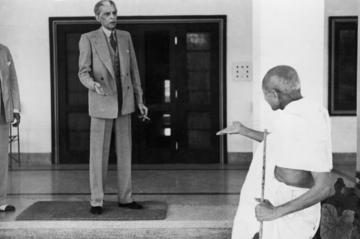
Jinnah is often cast as the victor in Partition, achieving his goal of an independent Pakistan, yet he complained bitterly before his death in 1948 that the final settlement was “moth-eaten” and incomplete.
Sean Phillips
The Long Partition
In August 1947 British India was partitioned, ending three hundred years of colonial rule with the creation two independent nations: India and Pakistan (comprising West and East Pakistan, present-day Bangladesh). From the tumultuous and tragic set of events that encompass this ‘Great’ and ‘Long’ Partition, much is set in stone: partition caused the ‘greatest mass movement of humanity in history’.
Twelve million refugees moved across new national borders drawn up by the British barrister Sir Cyril Radcliffe (who had famously never travelled further east than Paris before being tasked with drawing up the lines of partition). Crudely, this was a division based upon religious affiliation, with the creation of a Muslim majority in West and East Pakistan and a Hindu majority in India. Between 500,000 and 2 million souls perished as a result of the ensuing upheaval and violence. 80,000 women were abducted. India and Pakistan have since fought three wars over disputed boundaries in Kashmir (1947, 1965, and 1999).
In the long term, Partition has meant an ‘enduring rivalry’ between two nuclear-armed nations and continues to define the tone and character of Indian and Pakistani politics to this day. This resource takes just one approach to investigating Partition by analyzing the role of a key individual at the heart of the high politics of Partition.
Historiography: At A Glance
Most scholars today emphasize that Partition was neither an inescapable consequence of irreconcilable differences between Muslim and Hindu populations, nor an inevitable political manoeuvre by the British following decades of ‘divide and rule’. Rather, a complex interplay of factors, including rising communal tensions in the 1930s, political choices made by elites at both national and provincial levels, the impact of the Second World War and the widespread breakdown of law and order following the ‘Great Calcutta Killing’ in 1946 are important to consider as factors. As a caveat, much work that dwells upon the role of individuals as key stimuli to change is rather dated (or has at least been greatly revised and added to in recent decades). Caricatures do however still loom large in the literature, with accounts that present Nehru as a handsome, warm personality close to the “Hollywood version of a British prince”, the Last Viceroy, Lord Mountbatten standing in opposition to that of Mohammad Ali Jinnah, who is often defined as a cold, calculating presence. That the Congress Party politician Sarojini Naidu joked she needed a fur coat when in his presence is testament to this enduring characterization. Nehru thought that Jinnah represented “an obvious example of the utter lack of the civilized mind,” whilst Gandhi called him a “maniac” and “an evil genius.”
The Role of Muhammad Ali Jinnah
This resource invites us to consider how a secular, whisky-drinking, clean-shaven dandy with a penchant for Savile Row suits who rarely prayed at the mosque became seen as the ultimate champion of Muslim minority rights in India and who is today revered in Pakistan as the Quaid-i-Azam [Great Leader], whilst being widely reviled to this day by Indian nationalists as a harbinger of division and violence. He has been seen as the symbolic figure behind the two nation theory: an ideology that stressed religion, rather than language or ethnicity as the primary unifying characteristic to define populations in British India, meaning the necessity for the creation of two distinct nations at the end of empire. Ultimately however, Jinnah is perhaps Partition’s most contested and misunderstood character.
Born in 1876, Jinnah was educated at the Christian Missionary Society High School in Karachi before being sent to London in 1893 by his father to join Graham’s Shipping Company before he entered Lincoln’s Inn to study law (becoming the youngest Indian at that time to pass the bar in the process). In London, Jinnah discovered nationalist politics, assisting Dadabhai Naoroji, the first Indian Member of Parliament before returning to practice law in Bombay (at that time the only Muslim barrister in the city) which earned him considerable wealth and status. He joined the (mainly Hindu) Indian National Congress and the Muslim League, urging cooperation between the two organizations, describing the potential threat of Hindu domination of India as “a bogey, put before you by your enemies to frighten you… from cooperation and unity, which are essential for the establishment of self-government.” In 1916, Jinnah succeeded in urging the two organizations to present the British a common set of demands called the Lucknow Pact.
Gandhi’s emergence as a key political figure in the 1920s meant the marginalization of Jinnah within Indian politics. Deeply resenting the ways Gandhi brought a spiritual sensibility to the political mainstream, Jinnah was booed off stage at a Congress Party meeting in December 1920 when insisting on calling his rival ‘Mr. Gandhi’, rather than referring to his spiritual title, Mahatma [Great Soul]. A mutual dislike continued to grow: by the 1940s their relationship had grown so poisonous that they could barely be persuaded to sit in the same room. By this time, Jinnah had become the leading figure in a Muslim League that was advocating a separate homeland for the Muslim minority in India, a position he’d opposed earlier in his career, claiming that the option of Partition was simply “a bargaining chip.”
India divided or India destroyed
In his address, Jinnah emphasizes that the Muslim League was the sole organization committed to voicing the concerns of Muslims in India, arguing that they’d been betrayed after the 1937 elections with Muslim interests inadequately catered for. A divorce from Congress was advocated, with fears that the Constituent Assembly, much like independent India’s political life would be dominated by Hindus. Furthermore, since Muslims would have a key part to play in the political life of an independent India, they too must also have a role in decisions made with regard to independence, whilst also stressing that Hindus and Muslims constituted different nationalities: this is the two-nation theory.
With Gandhi and Nehru spearheading the ‘Quit India Movement’ during the chaos of the Second World War, both ending up in prison, Jinnah was able to define himself as a key British ally amidst the chaos, earning sympathies and consolidating opinion behind him as the best protector of Muslim interests against a Hindu dominance. In 1945-6 the Muslim League succeeded in general elections, widely becoming recognized as a ‘third political force’ in India alongside Congress and the British. With tensions increasingly heightened over the 1940s by regional political leaders, such as H. S. Suhrawardy, Muslim League Chief in Bengal, who provoked rioting against the Hindu populace in Calcutta, civil disturbances continued to rise. With the British administration feeling increasingly unable to manage what seemed an steadily worsening political situation, the then British Prime Minister, Clement Attlee, announced before Parliament that British rule would end in India “a date not later than June, 1948.” This was ultimately brought forward by a year by the British administration.
Partition was even by the late 1940s just one in a number of potential political outcomes. The notion of dividing the Indian subcontinent into Hindu-majority and Muslim-majority areas as is now characterized as the brainchild of Jinnah’s Muslim League went through various stages of evolution. Jinnah was most in favor of federation, given that Muslims were scattered right across the country. Nehru proved steadfast however in advocating a centralized and unified Indian state.
In the end, Nehru got a centralized Indian state, but not a unified one. Jinnah is often cast as the victor in Partition, achieving his goal of an independent Pakistan, yet he complained bitterly before his death in 1948 that the final settlement was “moth-eaten” and incomplete.
___________________
 Sean Phillips is DPhil candidate in History at Nuffield College. He is interested in histories of empire and expansionism in a global context, histories of decolonization and histories of the ‘Pacific World’.
Sean Phillips is DPhil candidate in History at Nuffield College. He is interested in histories of empire and expansionism in a global context, histories of decolonization and histories of the ‘Pacific World’.
Courtesy: Teaching Resources